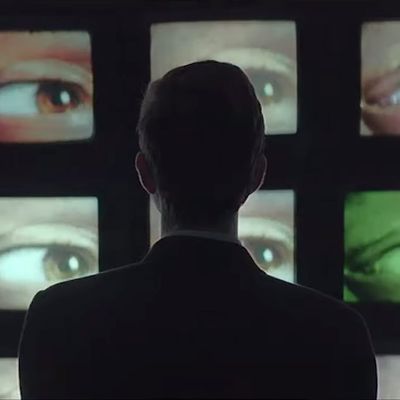
If a young David Cronenberg found himself working in present-day Turkey, he might have made a movie like The Antenna, a gripping combination of body horror, building horror, and political allegory. Director Or├ºun BehramÔÇÖs film unfolds in a desolate, brutalist apartment complex (the Turkish title, Bina, translates more accurately to The Building) seemingly in the middle of nowhere, as if the outside world were more idea than reality. But that idea seeps in ÔÇö literally, in some cases ÔÇö via a newfangled centralized satellite system that weÔÇÖre told will broadcast bulletins from an unnamed government into every apartment, thus inaugurating a momentous new era of unity. Surreal, queasiness-inducing shenanigans ensue.
Our hero is Mehmet (Ihsan ├ûnal), the gaunt-faced caretaker of the building complex who spends his days in a small booth staring off into space, his wide eyes, tiny mouth, and quiet delivery giving him the aura of a na├»f. (Perhaps pointedly, our only brief glimpse of a world outside the apartment complex is of the destitute and equally desolate neighborhood where Mehmet lives.) When the municipal worker who is installing the satellite system plummets to his death, the building manager sends Mehmet up there ÔÇö not to investigate what happened, but to make sure the work gets done on time. But whatÔÇÖs this black goo that seems to be slowly making its way around the building, dripping into peopleÔÇÖs lives and minds?
Behram introduces us to several of the individuals and families that live in the building, including Yasemin (G├╝l Arici), a melancholy young woman who dreams of escaping from a stuffy life stuck at home with her parents. Mehmet seems, in his own deadpan way, to have some kind of submerged longing for Yasemin and presents her with a train ticket out of town. (Yasemin is played by a 23-year-old actress. She looks like a grown woman when sheÔÇÖs with Mehmet but like a small child when sheÔÇÖs with her family ÔÇö a sly directorial touch, and maybe even a dig at the way unwed women are often infantilized by patriarchal cultures.)
The Antenna works first and foremost as a thriller that delivers its share of unsettling, upsetting images and scenarios ÔÇö even if it doesnÔÇÖt always seem to make a whole lot of sense or follow a clear narrative trajectory. The black goo invades different residentsÔÇÖ lives in different ways, targeting their vanity, their sense of identity, their desires. Wires grow out of walls and peopleÔÇÖs heads, faces disappear, and weÔÇÖre never quite sure whatÔÇÖs a dream, whatÔÇÖs a vision, and whatÔÇÖs reality. Behram uses lots of extreme angles, either impossibly high or impossibly low, so that the building, even when itÔÇÖs not in the frame, feels ever present ÔÇö as if the very air has become a part of this oppressive, corrosive architecture.
ItÔÇÖs worth noting that none of the characters seem excited about this ominous new satellite system. Instead, they are resigned and impatient, having accepted their fate as cogs in some indeterminate, infernal authoritarian wheel. Just get it over with seems to be the general attitude. (ItÔÇÖs also worth noting that, perhaps ironically, the arrival of satellite dishes in early 1990s Turkey inaugurated what was then billed as a historic era of freedom as a whole host of new privately owned channels were able to break the governmentÔÇÖs monopoly on TV broadcasts.)
Still, those looking for narrative or political clarity from a film like The Antenna might be barking up the wrong tree. Thanks to censor-happy governments past and present, Turkish artists have cultivated their own brand of nonspecific allegories ÔÇö not unlike Eastern European writers and filmmakers of the Soviet era, with their embrace of absurdist tropes and indeterminate settings. So you could read into The AntennaÔÇÖs discourse any number of ideas. (I watch it and I see a critique of the near-complete obliteration of an independent press, but IÔÇÖll also admit thatÔÇÖs a pretty shallow reading.) The film only goes so far in any of these directions ÔÇö and a late scene suggests that the target of its allegory is deeper and broader than any current political reality. What remains are the indelible and unnerving images that director Behram conjures.


